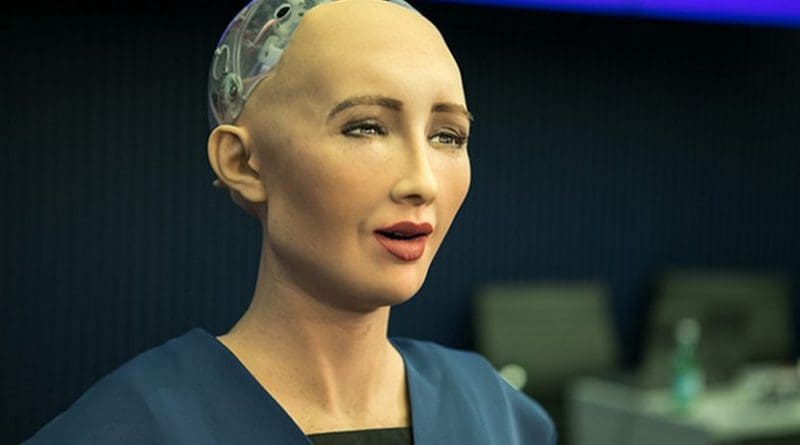Why Did Saudi Arabia Give A Robot Citizenship? – OpEd
By Ty Joplin
Sophia’s eyes stare blankly ahead.Though they do blink, it happens slowly and deliberately. When she smiles after telling a rehearsed joke, her expression morphs from cold and neutral to one that reflects a panicked mania, until her machinery sets her face back right again.
Sophia recently had the once-in-a-lifetime opportunity to address a crowd of investors as a Saudi tech conference, something most women in Saudi can never dream of doing.
But here’s the thing: Sophia is a robot.
Designed by a Hong Kong-based firm, and she is the first robot to ever be granted citizenship by a country. At a conference designed to attract investors to the desert kingdom, Saudi Arabia announced it would make Sophia a full-fledged citizen.
In what can be called ‘techwashing,’ this stunt is just one of a series of developments from Saudi where the Kingdom appears to be using its technological ambitions to gloss over its various human rights violations and oppression of its own population.
Immediately after the announcement, critics called into the question the decision to grant a female-appearing robot citizenship while its own female citizens continue to suffer a kind of second-class citizenship.
Sophia was seen without a male guardian, without any head covering and presumably left Saudi without needing the express approval or guardianship of a male to accompany her.
Ironically enough, the Saudi government’s allowance of the robot to bypass the inhumane laws regulating women’s actions and appearance shows they are not seriously considering her as one of their own.
Sophia’s newly-acquired citizenship comes just weeks after Saudi announced it would allow women to drive after over 40 years of prohibition, and comes around the same time as the Saudi Crown Prince Mohammed bin Salman announced that a new megacity will be built and will be mostly comprised of robots.
The announcement that a foreign-made, English-speaking robot named Sophia would become Saudi is just the latest in a plan masterminded by the Saudi Crown Prince Mohammed bin Salman, to transform Saudi from a land of oil-rich, conservative hermits to one that is economically diverse and globally integrated.
Earlier in October, bin Salman told The Guardian that he is seeking to return Saudi to ‘moderate Islam:’ “[w]e are simply reverting to what we followed – a moderate Islam open to the world and all religions. 70% of the Saudis are younger than 30, honestly we won’t waste 30 years of our life combating extremist thoughts, we will destroy them now and immediately.”
The reform efforts also limited the power of Saudi’s religious police. Bin Salman’s masterplan for Saudi is to be funded by a massive Initial Public Offering (IPO) of 5% of Saudi Aramco, the national oil company.
Though Saudi’s critics are right to point out the empowerment of Sophia while the same government keeps laws that actively harm women, they are missing a key part of Saudi’s motivation and strategy–one that helps explain their motive but still remains flawed.
Sophia’s newfound citizenship is a PR stunt–that goes without saying. But it wasn’t merely a PR stunt.
Sophia’s modern look, her international-background, her well-spoken albeit pre-programmed nature, the fact that she seems futuristic–this is bin Salman may want Saudi’s people of the future to look like.
In this way, granting this robot citizenship is Saudi’s way of signaling to the world who and what they are aspiring to be.
But if Saudi is relying on a robot to be their new model citizen, it simply poses further problems.
Actual people cannot be programed, and continue to live under an extraordinarily strict interpretation of Islam that forbids women to receive the same inheritance as men, travel without a man’s permission, or exist in public spaces unveiled if they so choose.
For these rights restrictions, Saudi’s biggest obstacle is its own religious/political doctrine. A head-on confrontation with itself currently being deflecting onto this robot who is only symbolically Saudi and largely falls between the cracks of Sharia law and Saudi’s overall governance system.
In showcasing the future of Saudi with a robot, bin Salman may have accidentally signalled that he is using tech and not his own people as the new standard-bearers of Saudi.

